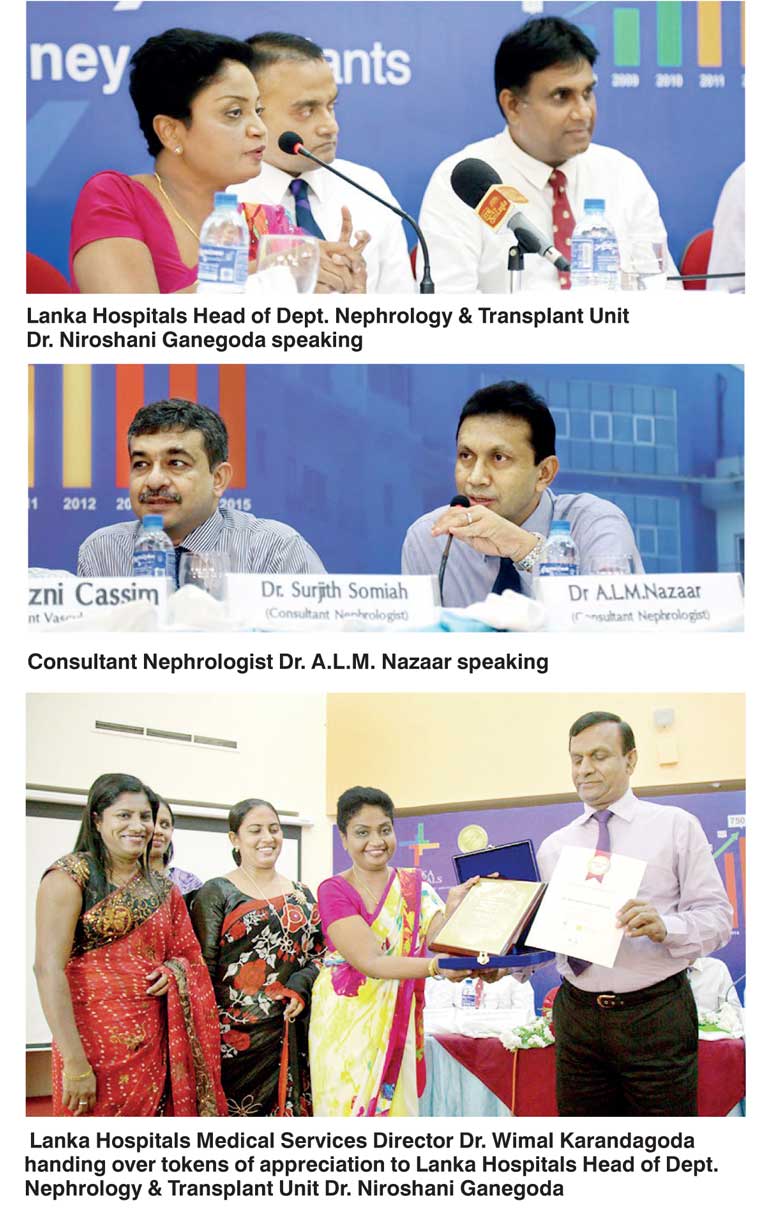Wednesday Feb 25, 2026
Wednesday Feb 25, 2026
Thursday, 9 July 2015 00:00 - - {{hitsCtrl.values.hits}}

Lanka Hospitals has now surpassed its 750th kidney transplant in just over 12 years since its inception. This is a milestone in the advancement of organ transplant in the country and a big stride in building confidence of patients on our country’s private medical services.
In connection with this noteworthy achievement, a team of nephrologists and kidney surgeons held a media briefing at Lanka Hospitals, on 3 July, highlighting the challenging journey and the controversial and significant issues revolving around kidney disease and kidney transplants in Sri Lanka.
“Lanka Hospitals’ achievement is not in the numbers alone. It is also in the stringent protective measures adopted in the transplant procedure from the screening of donors, the evaluation of a series of relevant facts and information, before written consent is obtained from donor and medical personnel involved in the transplant surgery,” the founder head of the unit Dr. Niroshini Ganegoda said.
Kidney transplants in Sri Lanka have had a controversial history, with a high success rate but also tainted with criticism of unethical practices.
Lanka Hospitals has therefore adopted extreme measures in maintaining ethical practices in the entire process of kidney transplants, from screening of donor eligibility, to educating patients on the complications of post recovery care.
Despite some criticism, it is a new dimension in medical history that kidney transplants are almost completely handled in the country and Lanka Hospitals has played a major role in the journey towards this status.
Dr. Ganegoda said that the process of going through a kidney transplant is traumatic; a grave responsibility on the hospital and the patient himself and his relatives who have to play a key role in post-operative recovery of the patient.
Greatest achievement: Adherence to the stringent standards in the process
All transplants are carried out in compliance with several international guidelines of kidney societies’ law and ethics and necessary approvals from the Ministry of Health in Sri Lanka.
“Although we are proud of the number of kidney transplants we have handled within 12 years, compared to other units, our greatest achievement is the adherence to the stringent standards in the process, which protects the donor as much as the patient,” Dr. Ganegoda said.
“Our evaluations and assessments begin with the establishment of suitability of the donor,” she added.
While the majority of the hospital’s transplants are living donor transplants, where a relative, friend or altruistic well-wisher donates the kidney, a few cadaveric (brain dead donor) transplants, where kidneys are obtained from brain dead donors has also been carried out.
Dr. Ganegoda also stated that out of the two types of transplants, cadaver (kidney taken from a brain dead donor) and live donor, an independent (ethical) team assesses the suitability of the donor in live transplants.
Great care and emphasis are laid on screening the donor and proper investigations into the donor’s history and health are established in order that the donor can live a healthy life after the donation. For example, young donors in their early 20s are discouraged from donating to very elderly patients, i.e. grandparents.
Kidney patients can live on dialysis support for over 10-20 years, but most patients opt for a transplant since it is the best, most convenient option. But ensuring that justice is done on both sides has been the most challenging task for Lanka Hospitals.
A large team of nephrologists, surgeons, anaesthetists and other medical personnel including doctors, nurses, etc are involved in the transplant operations. “Post-operative care is as important as the surgery itself,” Dr. Ganegoda says.
Lanka Hospitals is the only private healthcare provider in the country to offer some of the most modern, state-of-the-art technology used in the rest of the world today for successful kidney transplants. Patients with kidney transplants require lifelong medication. Low compliance of patients, i.e. not taking their medication as prescribed and leading a lifestyle not conducive for a kidney transplant patient are the main obstructions for post-transplant recovery.
While the hospital has a very high success rate, a successful transplant could sometimes take up to three attempts.
Dr. Ganegoda says that the commonest causes of kidney failure are long standing diabetes, untreated hypertension and repeated kidney infections among others. Dr. Ganegoda also pointed out that the key causes of kidney disease, importance of early detection and possible prevention strategies should reach the general population in the country.
Dr. Ganegoda said that there is a definite interest from our neighbouring countries where patients come to Lanka Hospitals for kidney transplants.
Lanka Hospitals is a 270-bed multi-specialty tertiary care hospital spread over 350,000 square feet with seven acres of beautifully landscaped garden. The hospital is internationally accredited (JCIA) and holds many track records making it one of the best healthcare providers in the world today. It offers state-of-the-art features that is complemented by cutting edge technology and is staffed by a well-experienced and trained team.
The hospital offers crucial emergency care, laboratory and testing services, pharmacy and other vital services round the clock for patients seeking urgent medical attention. The hospital is also equipped with a special Heart Centre, Fertility Clinic, Kidney Care Centre, Nuclear Medicine Centre, Cosmetic Clinic, Surgical Centre including Neuro, ENT, Eye, Gastrointestinal, Orthopaedic, Urology, Reconstructive surgeries, etc.